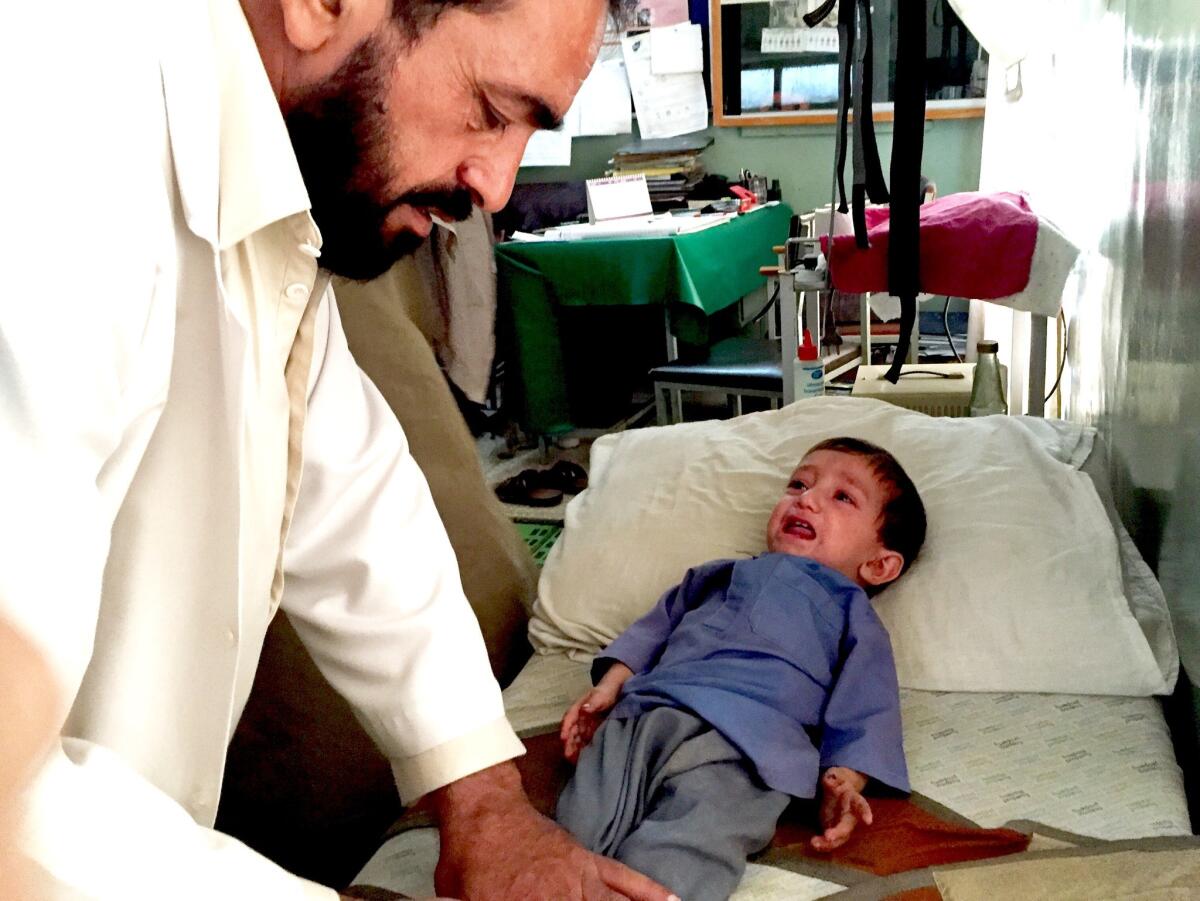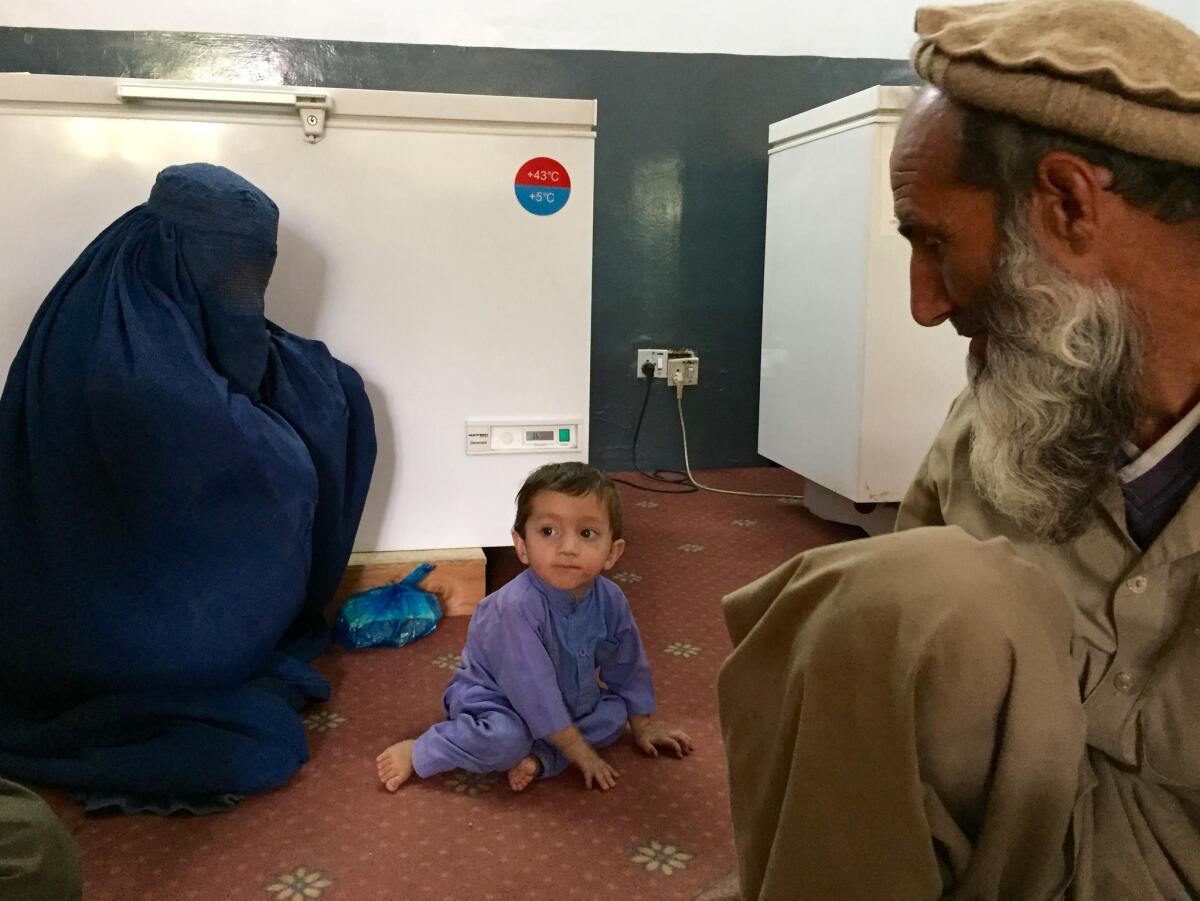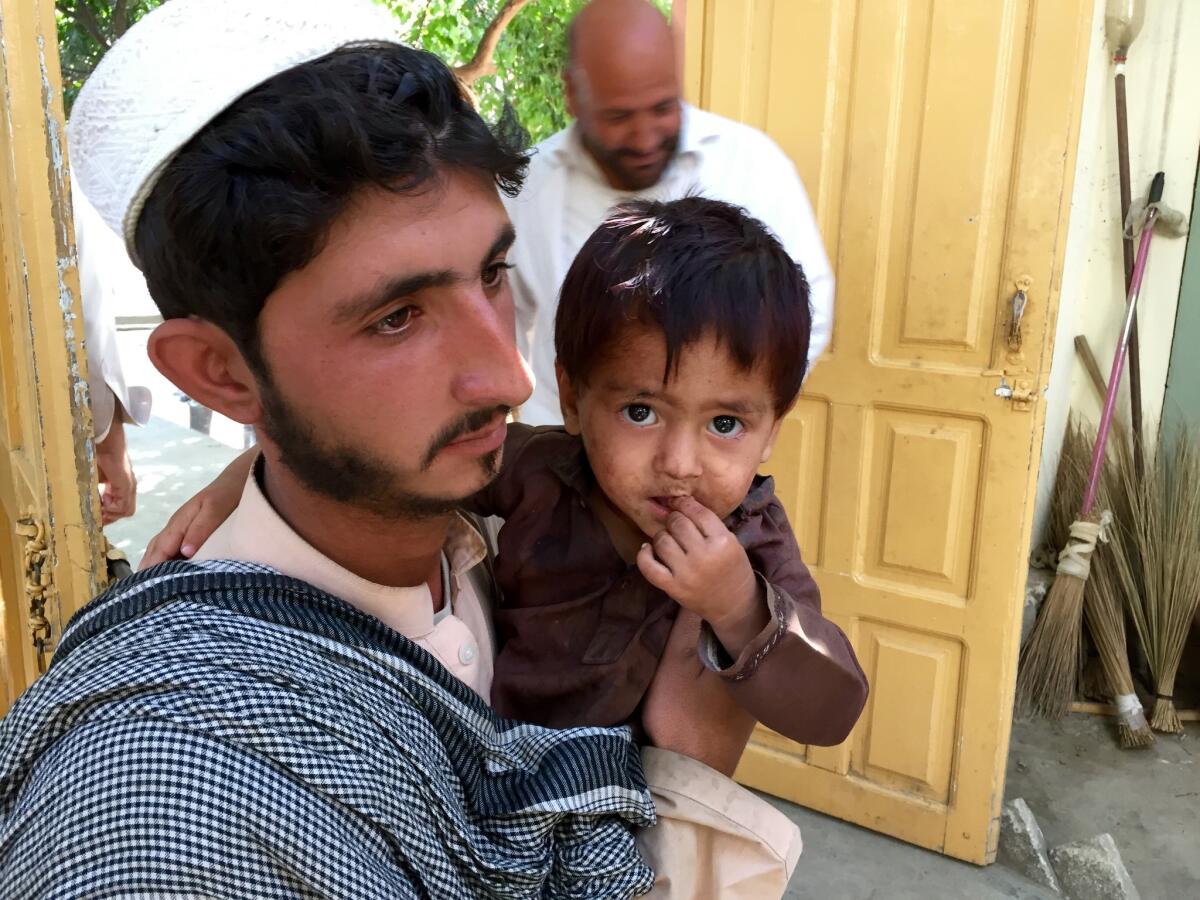This boy could be one of the world’s last victims of polio

- Share via
Reporting from Asadabad, Afghanistan — Khaksar’s family knew something was wrong when his fever didn’t break.
The 12-month-old wailed uncontrollably, tears streaming from his big brown eyes. His father visited a doctor in their lush, battle-scarred valley in eastern Afghanistan. But the pills he brought home did nothing.
After a week, the family bundled Khaksar into a taxi and rode for an hour and a half to the small hospital in Asadabad. Tests showed the boy had contracted a disease that is a relic of a past era: polio.
The narrow Sheltan valley, a haven for the Taliban and other insurgents along the border with Pakistan, is also one of the world’s last redoubts for the crippling childhood disease.
There have been 32 polio cases worldwide this year — four in Nigeria, 16 in Pakistan and 12 in Afghanistan. Of the Afghan cases, four — Khaksar and three others — are from this half-a-square-mile cluster of farming villages, home to about 1,000 people.
From 2012 until this summer, the threat of violence and the anti-Western policies of insurgents prevented health teams from entering the valley to vaccinate children, the only way to stop the virus’ spread.
The teams are part of a $1-billion-a-year international effort to eradicate a disease that 60 years ago was a worldwide scourge, paralyzing hundreds of thousands of children and confining the sickest to tank-like iron lungs so they could breathe. Since Jonas Salk developed the first safe polio vaccine in the 1950s, mass immunizations gradually wiped out the virus in the industrialized world and, starting in 1988, propelled a global campaign to vaccinate every child.
The campaign is achieving its goal, isolating the virus to ever-smaller zones and driving down the projected number of cases this year to fewer than half of the 74 seen in 2015.
Khaksar could be one of the last polio victims on the planet.
While that is good news for the world, it offers little comfort to his family.
“We have no idea what to do about this,” said his grandfather, Duran, a tall farmer with a long gray beard and, like many Afghans, one name. “Only God knows what will happen to him.”
::

The polio virus is highly contagious, and passes easily among humans through contaminated water or food. It attacks the spinal cord and can paralyze limbs.
In rural Afghanistan, where men and women support their families almost exclusively through physical labor, a crippling disability is like a life prison sentence.
Soon after falling ill in March, Khaksar began to lose function in his right leg. Doctors in Asadabad fitted him with a clunky metal brace that fastened above the knee and extended down to his toes, and was to be worn whenever he was awake.
He hated it. His grandfather and mother left the brace at home the morning they brought him for a checkup to the hospital in Asadabad, a collection of low, peach-painted buildings surrounding a tree-lined courtyard.
Khaksar was 18 months old, with stringy brown hair and an impish, sidelong gaze. His cries of discomfort were sharp and insistent, and he dragged his leg across the carpeted floor like a stuffed toy.
Inside the one-room physiotherapy ward, where black-and-white brochures of primitive-looking prosthetic devices hung in a display case, therapist Mohammad Nabi gently scolded Duran. The brace would help ensure Khaksar’s leg muscles did not atrophy, Nabi said.
“If he wears it, he might be able to walk one day,” he said. “Without that, it’s not going to be possible.”
The therapist took Khaksar from his grandfather’s arms, lay him on a narrow bed atop sheets stained a pale yellow and lifted and flexed each of his legs. Tears rolled down the boy’s round cheeks and wet the front of his blue tunic.
“Well,” Nabi said, “it’s difficult to tell his progress without the brace on. But it looks like it hasn’t gotten worse.”
“Our only hope is that he will be able to walk,” Duran said. “We expect the mercy of God.”

Across the room, another patient squirmed in his uncle’s arms. Zainullah was about the same age as Khaksar and lived in the same village.
His polio symptoms had shown up a month earlier but were more severe, paralyzing both his legs. Doctors said he would probably never be able to walk on his own.
The therapist grabbed Zainullah under both arms, placed him at the edge of the bed and lifted him upright so his feet dangled above the bedsheet.
Gently, he lowered the boy, watching to see if he could support his weight. But Zainullah’s legs flopped onto the sheet each time, buckling like a rag doll’s.
::
With Taliban militants battling government forces over more and more of Afghanistan’s territory — roughly one-third of the country is now either controlled or threatened by the insurgents — polio vaccination teams must constantly negotiate access to conflict-ridden areas.
The Taliban generally do not oppose vaccinations. In most areas, the teams, using local elders as mediators, have been able to persuade insurgents to let them work.
The situation has been more complicated in the Sheltan valley, which lies in Kunar province a few miles from Pakistan’s lawless tribal belt. While the area officially remains under government control, its wheat farms and sorghum fields have long served as a sanctuary not just for Afghan militants but also for Pakistani armed groups.
Health officials say the Pakistani Taliban — a separate organization that carries out attacks across the border — exercises influence in Sheltan and has portrayed the anti-polio effort to locals as both a front for Western espionage and a secret campaign to sterilize Muslims.
In 2012, tribal elders sent word to health officials in Asadabad, the provincial capital, that anti-polio teams would no longer be allowed. As a result, roughly 500 children under 5 years old — those most vulnerable to infection — were not vaccinated.
Of every 200 or so children infected with the virus, one goes on to develop serious symptoms, usually within weeks.
The four paralysis cases that emerged in the Sheltan valley this spring represented an explosion.
“It’s a very high number for such a small area,” said Maiwand Ahmadzai, director of the Afghan government’s emergency polio operations center in Kabul. “The virus is resilient in Afghanistan because it is surviving in these small pockets of inaccessibility.”
After the outbreak, the World Health Organization and other groups launched emergency immunization campaigns, deploying more teams to vaccinate children traveling in and out of the valley.
The effort seems to have worked, as there haven’t been any new cases near the valley since May. Afghan officials believe they can stop the spread of the virus altogether by mid-2017.
“We set up a firewall,” said Hemant Shukla, the WHO’s polio team leader in Kabul. “If the virus is not allowed to go outside that zone, it will burn itself out.”
In August, polio immunizations were allowed to resume in Sheltan, but in a limited way. Residents have asked the teams not to visit their houses or mark vaccination status on their doors as is standard practice elsewhere in the world.
Health officials worry they still won’t reach every child.
Meanwhile, violence has continued. The morning Khaksar’s family visited the hospital in Asadabad, rockets fired by unknown insurgents landed in the district center a few miles from Sheltan. Polio teams in the area suspended their work for the day.
::
Polio cannot be cured; it can only be prevented through vaccination. But Khaksar’s family has not given up hope.
One day this summer, Duran and the boy’s father, Wali, brought Khaksar to the busy border town of Jalalabad to see a doctor recommended by a tribal elder back home. The doctor had an office above the city’s main drag, a strip of shops selling cheap Chinese goods and dusty, secondhand electronics.
He pulled and prodded at Khaksar’s limbs and prescribed a few pills.
“We saw some good results,” Duran said. “It seemed like there were signs of movement in the leg.”
Back at the hospital in Asadabad, Nabi, the therapist, shook his head.
“Seeing such people is not a good idea,” he said.
Nearly four decades after the last polio outbreak in the United States, Khaksar’s struggle against the disease was just beginning.
Read more: How women in Pakistan are trying to defeat polio »
Follow @SBengali on Twitter for more news from South Asia
ALSO
Civilian death toll rises in U.S. air war against Islamic State
In Israel, pro-settlement advocates and rivals of two-state solution are emboldened by Trump victory
Activists blame U.S.-led coalition for airstrike in Syria that kills at least 20 people
More to Read
Sign up for Essential California
The most important California stories and recommendations in your inbox every morning.
You may occasionally receive promotional content from the Los Angeles Times.











